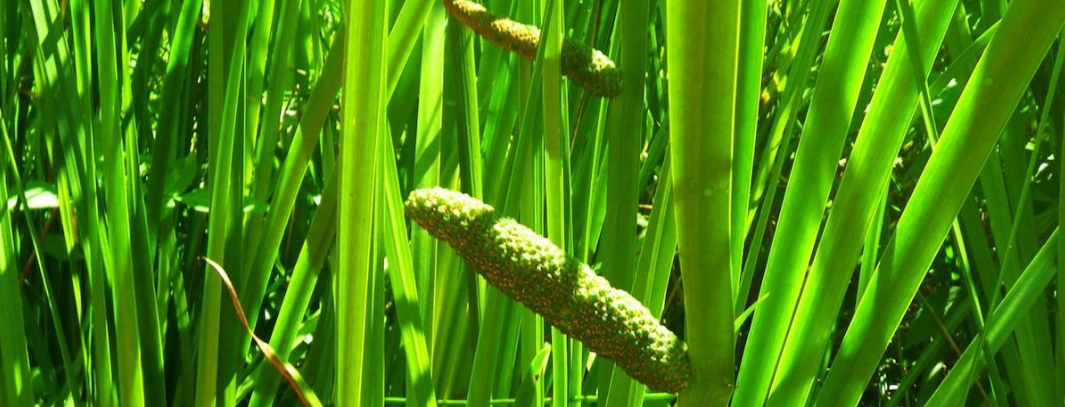Wholesale Calamus (Sweet Leaf) in Xekong, Lao People's Democratic Republic
Prime Felt and Agro Industries, Nepal is one of the largest wholesale supplier of Calamus (Sweet Leaf) in Xekong (Lao People's Democratic Republic)View more Trade specifications in the Catalog: Calamus (Sweet Leaf)

Acorus calamus L., a tall, perennial, grass-like monocot plant from the Acoraceae family, is a well-known plant in Ayurvedic medicines for centuries. Other common names of calamus include calamus root, flag root, muskrat root, sweet calomel, sweet flag, sweet sedge, and many other names.
It is a highly valued herb as it acts as a rejuvenator for the brain and nervous system. It is a main medhya drug, which has the property of improving memory power and intellect. Rhizomes of the plant are widely used in the treatment of a number of ailments such as epilepsy, mental ailments, chronic diarrhoea, dysentery, fever, abdominal tumours, kidney, and liver troubles, and rheumatism. A. calamus leaves, rhizomes and its essential oil possess many biological activities such as antispasmodic, carminative and are compiled in a simple approach in this review. This review presents a pragmatic description that deals with chemical constituents, toxicology, ethnobotany, and pharmacological properties of A. calamus for easy and better understanding of the outstanding medicinal potential of this very special plant and sirens for its conservation.
In Ayurvedic medicine calamus is an important herb, and is valued as a rejuvenator for the brain and nervous system, and as a remedy for digestive disorders.
But today, the use of calamus in digestive medicines has been discontinued in some countries because of possible toxic and carcinogenic effects. Toxicity is ascribed to beta-asarone. This compound may cause duodenal and liver cancer.
Acorus calamus extract is anti-rheumatic and analgesic. The extract is used in the form of powder and balms and it is very much useful in case of asthma, bronchitis and cough. As per Indian Ayurveda it was used as an anesthetic for toothache and headaches.
The rhizome contains from 1.5-3.5% essential oil which is extracted from the fresh roots or the unpeeled dried root by steam distillation. The essential oil is anticonvulsant, antiveratrinic and antiarrhythmic. It is also taken as an infusion, tincture or fluid extract.
Calamus oil should never be used in aromatherapy. Even though it is fairly safe as an herbal medicine when administered properly, users should not use it long-term or exceed recommended dosages.
If you are looking for a wholesaler of wool dryer balls in Xekong (Lao People's Democratic Republic) we are here to help you. We are the leading supplier of Calamus (Sweet Leaf) in Xekong, Lao People's Democratic Republic. We take custom orders and offer services like private labeling, custom designing and packaging services. We have experience of exporting wholesale Calamus (Sweet Leaf) to over 57 countries worldwide and have been providing the best price Calamus (Sweet Leaf) to our customers around the globe.
Custom requirements including Private Label Calamus (Sweet Leaf)
As Prime Felt and Agro Industries has both Felt manufacturing unit and a Agro-based product manufacturing/processing unit, we have the ability to cater to your custom Calamus (Sweet Leaf) requirement. Whether it is pack size, print design on packaging or even types of packaging, we can help get you the right support you need to keep your business in Xekong growing while adding various ranges of Calamus (Sweet Leaf) to your line of products.
Customs/Import duties
Please note that there may be customs charges/import duty on Calamus (Sweet Leaf) when you import them in bulk. Contact your local cargo agent in Xekong or local government body to get clear information about customs and respective charges. These duties usually only apply to wholesale bulk Calamus (Sweet Leaf). If you are shopping online wholesale packs, usually you do not have to pay for custom fees (depending on the item you order). Buy Calamus (Sweet Leaf) from our Online Shop
We supply bulk wholelsale Calamus (Sweet Leaf) to other states in Lao People's Democratic Republic
We have been supplying our wholesale Calamus (Sweet Leaf) to other states in Lao People's Democratic Republic. Request a wholesale quote and experience the difference with Prime Felt & Agro Industries.
Attapu, Bokeo, Bolikhamxai, Champasak, Houaphan, Khammouan, Louang Namtha, Louangphabang, Oudomxai, Phongsali, Salavan, Savannakhet, Vientiane, Vientiane, Xaignabouli, Xaisomboun, Xekong, Xiangkhoang,







